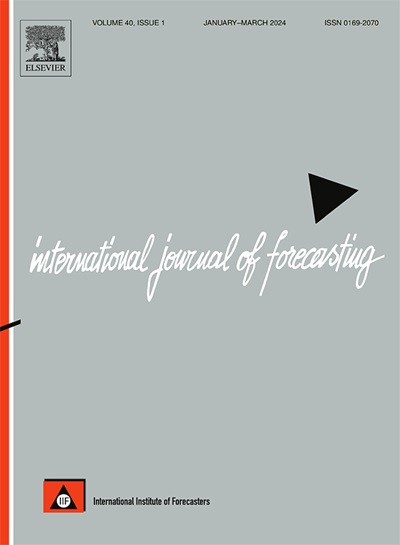Decision-focused linear pooling for probabilistic forecast combination
IF 7.1
2区 经济学
Q1 ECONOMICS
引用次数: 0
Abstract
In real-world settings, decision-makers often have access to multiple forecasts for the same unknown quantity. Combining different forecasts has long been known to improve forecast quality, as measured by scoring rules in the case of probabilistic forecasting. However, improved forecast quality does not always translate into better decisions in a downstream problem that utilizes the resultant combined forecast as input. To this end, this work proposes a novel probabilistic forecast combination approach that accounts for the downstream stochastic optimization problem by which the decisions will be made. We propose a linear pool of probabilistic forecasts where the respective weights are learned by minimizing the expected decision cost of the induced combination, which we formulate as a nested optimization problem. Two methods are proposed for its solution: a gradient-based method that utilizes differential optimization layers, and a performance-based weighting method. The proposed decision-focused combination approach is validated in two integral problems associated with renewable energy integration in low-carbon power systems and compared against well-established combination methods. Namely, we examine an electricity market trading problem under stochastic solar production and a grid scheduling problem under stochastic wind production. The results illustrate that the proposed approach leads to lower expected downstream costs, while optimizing for forecast quality when estimating linear pool weights does not always translate into better decisions. Notably, optimizing for a combination of downstream cost and an accuracy-oriented scoring rule consistently leads to better decisions while also improving forecast quality.
以决策为中心的概率预测组合线性池
在现实世界中,决策者通常可以获得对同一未知量的多种预测。结合不同的预测早已被认为可以提高预测质量,就像在概率预测的情况下通过评分规则来衡量的那样。然而,改进的预测质量并不总是转化为在下游问题中更好的决策,下游问题利用结果组合预测作为输入。为此,本工作提出了一种新的概率预测组合方法,该方法可以解释下游随机优化问题,从而做出决策。我们提出了一个线性概率预测池,其中通过最小化诱导组合的预期决策成本来学习各自的权重,我们将其表述为嵌套优化问题。针对该问题提出了两种解决方法:基于梯度的差分优化层法和基于性能的加权法。通过对低碳电力系统中可再生能源集成的两个整体问题进行验证,并与已有的组合方法进行比较。也就是说,我们研究了随机太阳能生产下的电力市场交易问题和随机风力生产下的电网调度问题。结果表明,所提出的方法导致较低的预期下游成本,而在估计线性池权重时优化预测质量并不总是转化为更好的决策。值得注意的是,对下游成本和以准确性为导向的评分规则的组合进行优化,可以在提高预测质量的同时做出更好的决策。
本文章由计算机程序翻译,如有差异,请以英文原文为准。
求助全文
约1分钟内获得全文
求助全文
来源期刊

International Journal of Forecasting
Multiple-
CiteScore
17.10
自引率
11.40%
发文量
189
审稿时长
77 days
期刊介绍:
The International Journal of Forecasting is a leading journal in its field that publishes high quality refereed papers. It aims to bridge the gap between theory and practice, making forecasting useful and relevant for decision and policy makers. The journal places strong emphasis on empirical studies, evaluation activities, implementation research, and improving the practice of forecasting. It welcomes various points of view and encourages debate to find solutions to field-related problems. The journal is the official publication of the International Institute of Forecasters (IIF) and is indexed in Sociological Abstracts, Journal of Economic Literature, Statistical Theory and Method Abstracts, INSPEC, Current Contents, UMI Data Courier, RePEc, Academic Journal Guide, CIS, IAOR, and Social Sciences Citation Index.
 求助内容:
求助内容: 应助结果提醒方式:
应助结果提醒方式:


